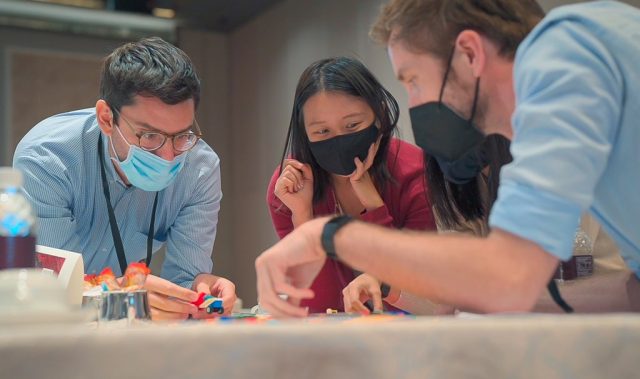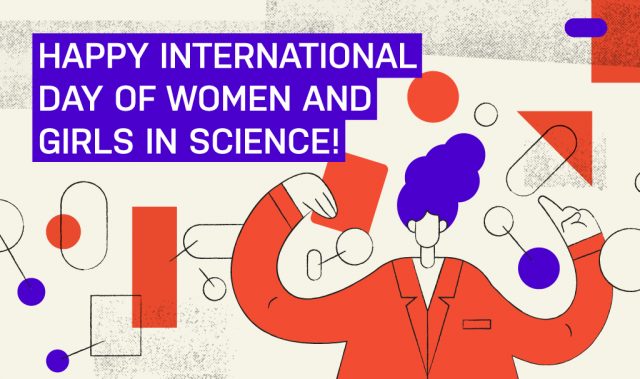
AsianScientist (Oct. 8, 2018) – Discussions about genes and genetically modified organisms (GMOs) can be complex and divisive. But who better to hear the facts from than Sir Richard J. Roberts FRS, who was awarded the 1993 Nobel Prize in Physiology or Medicine for discovering the fundamentals of gene regulation?
On the evening of October 5, 2018, Wildtype Media Group invited Roberts to a casual dialogue about science with some 250 members of the public at the swanky 1880 club in Singapore. The session, moderated by 1880 founder Marc Nicholson, saw Roberts articulate his views on science communication, open access publishing and GMOs.
“When I heard that Richard was in town, I leapt at the opportunity and I asked him if he would join us,” said Dr. Juliana Chan, CEO of Wildtype Media Group. “I think he also took a leap of faith, because this is not the usual scientific conference or audience.”
Scientists as champions for science
Walking the talk, Roberts urged scientists—some of whom were in the audience—to reach out to the general public, especially now when the gap between the scientific community and the public is widening. While educating the young in schools plays a part in scientific literacy, he emphasized that scientists also ought to be trained to communicate with the general public.
As a start, Roberts recommended the “grandmother test” that requires scientists to be able to explain to their grandmothers what they are doing in the laboratory, and why it is important.
“Get her to understand it so well, that she can go on and tell all her friends accurately what it is you are doing—and why you are such a great grandchild,” he quipped.

Breaking down barriers to communication
Another obstacle to science communications highlighted by Roberts was paywalled journals, and he voiced his support for publishing research in open access journals.
“If I do an important piece of work, I want everybody to read it, including the general public,” he said.
Roberts noted that he has rallied 49 Nobel Laureates to petition for scientific papers to be made freely available to everyone, and has opted not to publish his work in paywalled journals such as Nature and Science. In his view, making research articles accessible to the public is a step towards creating awareness and deepening understanding of scientific issues, so that the public need not rely solely on mainstream media outlets.
“[The mainstream media] love to tell a story about something that has happened in science and have a supposed ‘expert’ on the other side, [positioning the debate] as though it were an equal issue,” Roberts said, “But issues like climate change, GMOs and vaccinations are not equal issues. They are not debatable because the science is solid.”
Food for thought
Steering the discussion to the non-debate on GMOs, Roberts also shared how he got involved in GMO advocacy after learning from plant biologists that their work was being obstructed by well-funded organizations like Greenpeace.
“[Greenpeace] started to talk about ‘Frankenfoods’ and were trying to make the case that these were going to be really dangerous,” he elaborated, observing that many scientific issues evolve to become emotional rather than factual.
“The people at Greenpeace have yet to provide solid evidence that counters the benefits of GMOs, so they play on the emotions [of the public],” he said, “If anything, GMOs are actually much safer than plants bred by using traditional means.”
As if to drive home the point, Mr. Henry Woodward-Fisher, international launch manager at Impossible Foods, treated the audience to sliders—miniature burgers—containing patties made of wheat protein, coconut oil, potato and heme. Heme is an iron-containing, naturally-occurring molecule in meat and plants that is responsible for the taste of beef. Most of the audience had no knowledge that the sliders were 100 percent plant-based, until they were told otherwise.

As the discussion drew to a close, Chan thanked Roberts and presented him with a token of appreciation for taking the time to share his insights.
“At Wildtype Media Group, we seek to bridge the gap between scientists and society. We are grateful to Richard for accommodating our mission, and we thank Marc for providing this beautiful venue,” Chan concluded.
———
Copyright: Asian Scientist Magazine; Photo: Wildtype Media Group/Cyril Ng.
Disclaimer: This article does not necessarily reflect the views of AsianScientist or its staff.












